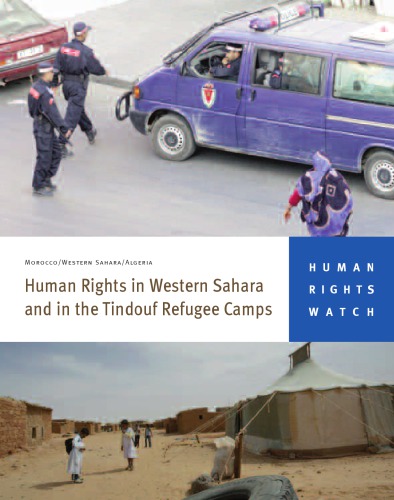Product desciption
Human Rights In Western Sahara And In The Tindouf Refugee Camps Moroccowestern Saharaalgeria Goldstein by Goldstein, Eric; Van Esveld, Bill 9781564324207, 1564324206 instant download after payment.
"This report is in two parts. Part one examines present-day human rights conditions in Western Sahara. Part two examines present-day human rights conditions in the Sahrawi refugee camps administered by the Popular Front for the Liberation of Saguia el-Hamra and Rio de Oro (Polisario), the Sahrawi independence organization, near Tindouf, Algeria. For Western Sahara, the focus of Human Rights Watch's investigation is the right of persons to speak, assemble, and associate on behalf of self-determination for the Sahrawi people and on behalf of their human rights. We found that Moroccan authorities repress this right through laws penalizing affronts to Morocco's territorial integrity, through arbitrary arrests, unfair trials, restrictions on associations and assemblies, and through police violence and harassment that goes unpunished. For the refugee camps in Tindouf, the focus is freedom of expression and of movement. We found that at the present time, the Polisario effectively marginalizes those who directly challenge its leadership or general political orientation, but it does not imprison them. It allows residents to criticize its day-to-day administration of camp affairs. In practice, camp residents are able to leave the camps, via Mauritania, if they wish to do so. However, fear and social pressure keeps those who plan to resettle in Western Sahara from disclosing their plans before leaving"--Page 2.
Abstract: "This report is in two parts. Part one examines present-day human rights conditions in Western Sahara. Part two examines present-day human rights conditions in the Sahrawi refugee camps administered by the Popular Front for the Liberation of Saguia el-Hamra and Rio de Oro (Polisario), the Sahrawi independence organization, near Tindouf, Algeria. For Western Sahara, the focus of Human Rights Watch's investigation is the right of persons to speak, assemble, and associate on behalf of self-determination for the Sahrawi people and on behalf of their human rights. We found that Moroccan authorities repress this right through laws penalizing affronts to Morocco's territorial integrity, through arbitrary arrests, unfair trials, restrictions on associations and assemblies, and through police violence and harassment that goes unpunished. For the refugee camps in Tindouf, the focus is freedom of expression and of movement. We found that at the present time, the Polisario effectively marginalizes those who directly challenge its leadership or general political orientation, but it does not imprison them. It allows residents to criticize its day-to-day administration of camp affairs. In practice, camp residents are able to leave the camps, via Mauritania, if they wish to do so. However, fear and social pressure keeps those who plan to resettle in Western Sahara from disclosing their plans before leaving"--Page 2


